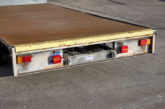
Autotech Connect has unveiled its Cybercrime Audit service designed to help independent garages identify and understand growing digital risks.
With cyberattacks reportedly escalating globally, this initiative offers the automotive aftermarket a shield, focusing on prevention through awareness.
According to the UK Government’s Cyber Security Breaches Survey 2025, 43% of UK businesses, equating to approximately 612,000 organisations, experienced a cybersecurity breach or attack in the past 12 months. Over 560,000 new cyber threats are now discovered every day and 81% of UK businesses targeted by cyberattacks are small and medium-sized enterprises. Therefore, cybercrime is said to be one of the fastest-growing threats to the automotive aftermarket. As the sector becomes increasingly reliant on connected tools, cloud-based systems and digital infrastructure, garages are being exposed to risks many still underestimate.
Darren Dowling, Client Services Director at Autotech Connect comments: “Most independent garages aren’t aware of how exposed they are. These businesses rely on a growing range of connected technologies, from EV charging points and diagnostic tools to customer-facing apps and cloud-based software, but few have the defences in place to match.”
Autotech Connect’s nationwide programme of cybercrime audits has been designed to identify vulnerabilities before attackers do. These audits provide garage owners and workshop managers with an evidence-based picture of their digital exposure, across everything from hardware and email security to employee awareness and cloud app usage.
The 32-point audit evaluates a workshop’s digital infrastructure across several critical areas. It includes vulnerability assessments of routers, firewalls, and firmware, as well as checks on IT setup and performance, such as patching and system updates.
Email security is also reviewed, including the effectiveness of spam filters and encryption protocols. The audit carries out dark web scans to detect any compromised credentials. In addition, it assesses the security of cloud applications, tests user awareness through simulated phishing attacks, and examines endpoint and antivirus protection. Finally, it evaluates the overall security of the network and Wi-Fi systems.
Darren continued: “Today’s attack surfaces stretch far beyond the office desktop. Threats like phishing, business email compromise, and supply chain attacks aren’t limited to large corporations. Even a breach at an independent garage could expose customer records, supplier information, or potentially compromise vehicle control systems.”









